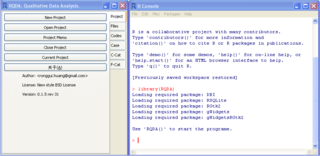
Wolfram Mathematica is a software system with built-in libraries for several areas of technical computing that allow machine learning, statistics, symbolic computation, data manipulation, network analysis, time series analysis, NLP, optimization, plotting functions and various types of data, implementation of algorithms, creation of user interfaces, and interfacing with programs written in other programming languages. It was conceived by Stephen Wolfram, and is developed by Wolfram Research of Champaign, Illinois. The Wolfram Language is the programming language used in Mathematica. Mathematica 1.0 was released on June 23, 1988 in Champaign, Illinois and Santa Clara, California.

Qualitative research is a type of research that aims to gather and analyse non-numerical (descriptive) data in order to gain an understanding of individuals' social reality, including understanding their attitudes, beliefs, and motivation. This type of research typically involves in-depth interviews, focus groups, or observations in order to collect data that is rich in detail and context. Qualitative research is often used to explore complex phenomena or to gain insight into people's experiences and perspectives on a particular topic. It is particularly useful when researchers want to understand the meaning that people attach to their experiences or when they want to uncover the underlying reasons for people's behavior. Qualitative methods include ethnography, grounded theory, discourse analysis, and interpretative phenomenological analysis. Qualitative research methods have been used in sociology, anthropology, political science, psychology, communication studies, social work, folklore, educational research, information science and software engineering research.
In the context of software engineering, software quality refers to two related but distinct notions:
Google Developers is Google's site for software development tools and platforms, application programming interfaces (APIs), and technical resources. The site contains documentation on using Google developer tools and APIs—including discussion groups and blogs for developers using Google's developer products.
VTune Profiler is a performance analysis tool for x86 based machines running Linux or Microsoft Windows operating systems. Many features work on both Intel and AMD hardware, but advanced hardware-based sampling requires an Intel-manufactured CPU.

The Sleuth Kit (TSK) is a library and collection of Unix- and Windows-based utilities for extracting data from disk drives and other storage so as to facilitate the forensic analysis of computer systems. It forms the foundation for Autopsy, a better known tool that is essentially a graphical user interface to the command line utilities bundled with The Sleuth Kit.
ATLAS.ti is a computer-assisted qualitative data analysis software that facilitates analysis of qualitative data for qualitative research, quantitative research, and mixed methods research.
Intel Parallel Studio XE was a software development product developed by Intel that facilitated native code development on Windows, macOS and Linux in C++ and Fortran for parallel computing. Parallel programming enables software programs to take advantage of multi-core processors from Intel and other processor vendors.

Parasoft is an independent software vendor specializing in automated software testing and application security with headquarters in Monrovia, California. It was founded in 1987 by four graduates of the California Institute of Technology who planned to commercialize the parallel computing software tools they had been working on for the Caltech Cosmic Cube, which was the first working hypercube computer built.

RQDA is an R package for computer assisted qualitative data analysis or CAQDAS. It is installable from, and runs within, the R statistical software, but has a separate window running a graphical user interface. RQDA's approach allows for tight integration of the constructivist approach of qualitative research with quantitative data analysis which can increase the rigor, transparency and validity of qualitative research.
Computer-assistedqualitative data analysis software (CAQDAS) offers tools that assist with qualitative research such as transcription analysis, coding and text interpretation, recursive abstraction, content analysis, discourse analysis, grounded theory methodology, etc.
MAXQDA is a software program designed for computer-assisted qualitative and mixed methods data, text and multimedia analysis in academic, scientific, and business institutions. It is being developed and distributed by VERBI Software based in Berlin, Germany.
QSR International is a qualitative research software developer based in Burlington, Massachusetts, with offices in Australia, Germany, New Zealand, and the United Kingdom. QSR International is the developer of qualitative data analysis (QDA) software products, NVivo, NVivo Server, Interpris and XSight. These are designed to help qualitative researchers organize and analyze non-numerical or unstructured data.
Aquad is open source computer-assisted qualitative data analysis software (CAQDAS). It supports analysis of text, audio, video, and graphical data.
The Qualitative Data Analysis Program (QDAP) was founded in 2005 at the University of Pittsburgh in the University Center for Social and Urban Research. QDAP is a fee-for-service research laboratory that develops software and methods to support multi-coder annotation projects. In 2008, QDAP-UMass was opened at the University of Massachusetts Amherst. Researchers at QDAP developed the Coding Analysis Toolkit (CAT), which is a free, open source, web-based CAQDAS package.
QDA Miner is mixed methods and qualitative data analysis software developed by Provalis Research. The program was designed to assist researchers in managing, coding and analyzing qualitative data.
Quantitative Discourse Analysis Package (qdap) is an R package for computer assisted qualitative data analysis, particularly quantitative discourse analysis, transcript analysis and natural language processing. Qdap is installable from, and runs within, the R system.
Cassandre is a free open source software for computer assisted qualitative data analysis and interpretation in humanities and social sciences. Although it refers, like other CAQDAS-software, to Grounded Theory Method, it also allows to conduct discourse analysis or quantitative content analysis. The software is designed as a server to support collaborative work. Formerly focused on semi-automatic coding, it now provides diaries assisting qualitative analysis.

KH Coder is an open source software for computer assisted qualitative data analysis, particularly quantitative content analysis and text mining. It can be also used for computational linguistics. It supports processing and etymological information of text in several languages, such as Japanese, English, French, German, Italian, Portuguese and Spanish. Specifically, it can contribute factual examination co-event system hub structure, computerized arranging guide, multidimensional scaling and comparative calculations. Word frequency statistics, part-of-speech analysis, grouping, correlation analysis, and visualization are among the features offered by KH Coder.

Quirkos is a CAQDAS software package for the qualitative analysis of text data, commonly used in social science. It provides a graphical interface in which the nodes or themes of analysis are represented by bubbles. It is designed primarily for new and non-academic users of qualitative data, to allow them to quickly learn the basics of qualitative data analysis. Although simpler to use, it lacks some of the features present in other commercial CAQDAS packages such as multimedia support. However, it has been proposed as a useful tool for lay and participant led analysis and is comparatively affordable. It is developed by Edinburgh, UK based Quirkos Software, and was first released in October 2014.






